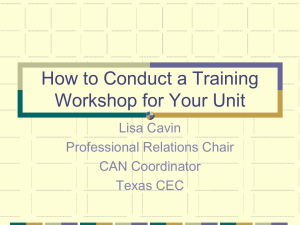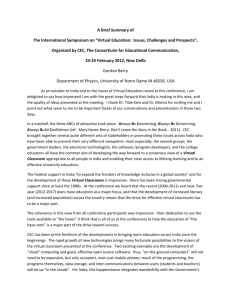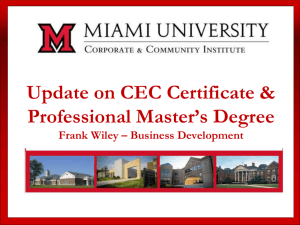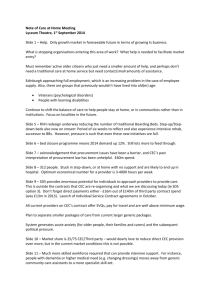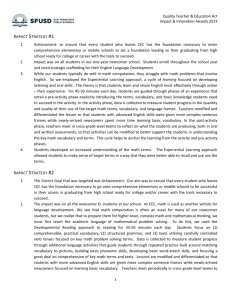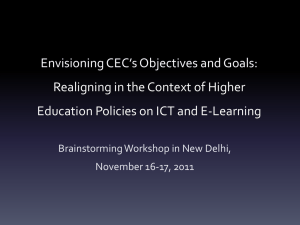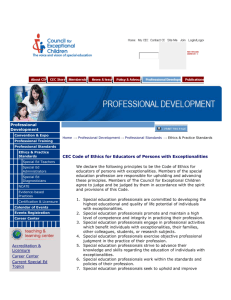Coleman Reading Nonfiction Breakout
advertisement
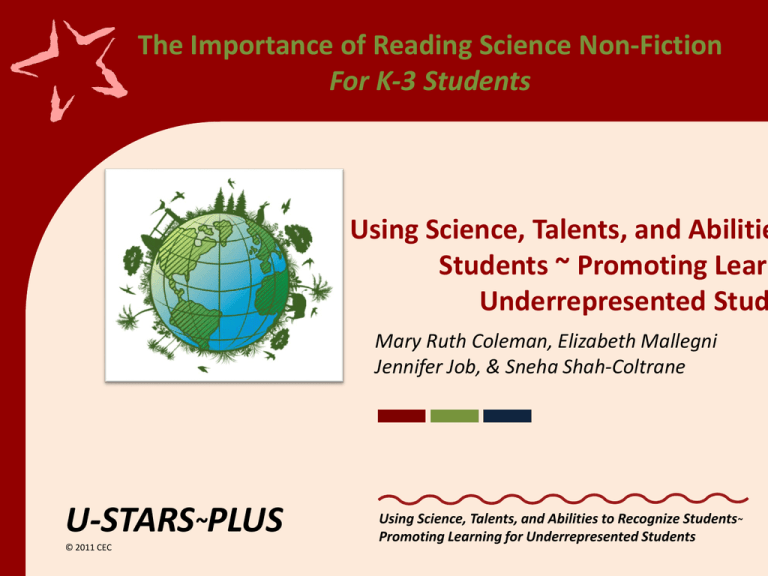
The Importance of Reading Science Non-Fiction For K-3 Students Using Science, Talents, and Abilitie Students ~ Promoting Learn Underrepresented Stud Mary Ruth Coleman, Elizabeth Mallegni Jennifer Job, & Sneha Shah-Coltrane U-STARS~PLUS © 2011 CEC Using Science, Talents, and Abilities to Recognize Students~ Promoting Learning for Underrepresented Students Module 3 U-STARS~PLUS “The Big Star” © 2011 CEC U-STARS~PLUS Module 3 The Heart of U-STARS~PLUS Bringing Out the Best in Student Potential © 2011 CEC U-STARS~PLUS Module 3 To appropriately recognize potential in students, 1. A teacher must know what to look for. 2. Classroom responses should support highend learning. 3. The classroom climate should be emotionally supportive, so children will show us their best. © 2011 CEC U-STARS~PLUS Gifted and Talented Programming Allen-Field School Module 3 “Every child is special if we create conditions in which that child can be a specialist within a specialty group” Renzulli, 1994 © 2011 CEC U-STARS~PLUS Module 3 School vision Allen-Field is a place of excellence where every student will be equipped with 21st century skills to succeed in middle school and beyond. © 2011 CEC U-STARS~PLUS Module 3 Allen-Field is committed to: • Teaching ways of thinking. Creativity, critical thinking, problem-solving, decision-making and learning • Modeling and teaching ways of working. Communication and collaboration • Teaching tools for working. Information and communication technology (ICT) and information literacy • Teaching skills for living in the world. Citizenship, life and career, and personal and social responsibility © 2011 CEC U-STARS~PLUS Module 3 Allen-Field is a High Needs Urban School Our Data Shows: 1. Current enrollment shows a decrease of student enrollment since the 2010-2011 school year. 2. Increase of %SWD by 5.5. 3. Increase of % Free/Red by 2.3 4. Increase of 3.8% of African Amer. students © 2011 CEC U-STARS~PLUS Module 3 Our Current Reading Data 65% of our K5-5th grade students and ELL students with proficiency level of 3 or higher are performing below target. © 2011 CEC U-STARS~PLUS Module 3 Our Goal • Allen-Field School will reform its current bilingual gifted and talented program to become a School Wide Enrichment school. It will utilize U-Stars Plus student and parent Reading activities to provide high end rigorous learning experiences to ALL students. © 2011 CEC U-STARS~PLUS Module 3 Differentiation for High-End Learning Working to adjust the teaching/learning activities to address individual learning needs Coleman, M. R. (1998). Are we serious about meeting students’ needs? Gifted Child Today, 21(1), 40–41. © 2011 CEC U-STARS~PLUS Module 3 Ways to Modify the Curriculum for Gifted Learners 1. Acceleration – adjusting the pace of learning 2. Enrichment – allowing for more depth and exploration 3. Sophistication – bringing more complexity and abstraction to the subject 4. Novelty – providing opportunities not generally offered in the curriculum Gallagher, J., & Gallagher, S. (1994). Teaching the gifted child (4th ed.). Boston, MA: Allyn & Bacon. © 2011 CEC U-STARS~PLUS Module 3 Toolkit of strategies for differentiation in the general education classroom • • • • Curriculum compacting Tiered assignments Learning centers/stations Independent/small group contracts and projects • Questioning techniques/effective questioning to promote higher order thinking skills © 2011 CEC U-STARS~PLUS Module 3 Making More Connections! Reading in the content areas is a major focus of the common core standards! Nonfiction reading in science is exciting! © 2011 CEC U-STARS~PLUS Module 3 U-STARS~PLUS Nonfiction Connections Building content area reading skills in Science Book summaries (Grades K–3) Concept maps Discussion questions and activities based on Bloom’s Taxonomy © 2011 CEC U-STARS~PLUS Module 3 Reading Nonfiction Thank you to Jennifer Job for her contributions to this work! © 2011 CEC U-STARS~PLUS Module 3 Importance of Nonfiction Reading • • • • • • © 2011 CEC Activating Prior Knowledge More Directly Exploring Interests Real World Providing Explicit Instruction Building Academic Vocabulary Enhancing Higher Level Thinking Strengthening Expository Writing Skills U-STARS~PLUS Module 3 Building Vocabulary • Builds Academic Vocabulary/Knowledge • Facilities Discussion of Information • Introduces Words like “species,” “heard,” “migration” • Provides Authentic use of Words in Context • Uses Pictures, Graphics, & Text to Show Meanings © 2011 CEC U-STARS~PLUS Module 3 Expository Writing • Organization Features (heading, glossaries, graphs) • Text Structures (chronological, categorization, characterization, causeeffect, problem-solving) • Visual Features (pictures, charts, graphics) © 2011 CEC U-STARS~PLUS Module 3 Nonfiction Reading Standards (review handout and discuss) • Why is reading nonfiction so important? • How do these standards enhance “explicit” teaching? • In what ways will these skills be useful through out life? © 2011 CEC U-STARS~PLUS Module 3 Fiction vs. Nonfiction • Identifying Vocabulary • Predicting of Plot Development • Retelling/Restating • Summarizing • Recognizing Themes • Attending to Details • Identifying Characters (roles) © 2011 CEC • Developing Vocabulary • Categorizing/Classifying • Activating and Building Prior Knowledge • Identifying Main Ideas/Support • Interpreting Visuals • Developing Questions • Connecting Ideas Across Texts U-STARS~PLUS Module 3 Reading Nonfiction is also Different • • • • • • © 2011 CEC Skimming Researching/Inquiry Projects Seeking Answer to a Specific Question Looking for Key Ideas or Support Building a “Case” Connecting with other Content Areas U-STARS~PLUS Module 3 Strategies for Nonfiction • Improve Understanding Before Reading (vocabulary, contextually information, preview pictures/graphics, explicit teaching/background information) • Check Comprehension (SQ3R) • Note Taking and Study Strategies • Concept Mapping with Students (Ciullo & Billingsley, 2014) © 2011 CEC U-STARS~PLUS Module 3 Questions for Nonfiction • “Right There” Facts – directly in the text • “Think & Search” – may be in two or more places in the text • “The Author and You” – requires judgment, opinion/conclusion supported by text (Ciullo & Billingsley, 2014) © 2011 CEC U-STARS~PLUS Module 3 Creating Your Own Connections • Select your Book • What are the major science connections? • Which New Generation Science Standards are addressed? • Which language arts standards are addressed (nonfiction)? © 2011 CEC U-STARS~PLUS Module 3 USTARS~PLUS Lesson Outline: Nonfiction Title: Lexical Score: Author: Pages: Illustrator: Translations: Publisher: ISBN: Major Topics: Generalization: Concept Map: U-STARS Fiction Books: National Science Standards: Common Core Standards: Literacy: Math: Summary of Book (focus on content learned, key facts, etc.): Thinking Questions Based on Blooms: Knowledge/Remember – Comprehension/Understand – Application/Apply – Analysis/Analyze – Synthesis/Create – Evaluation/Evaluate – Follow-up Activities © 2011 CEC U-STARS~PLUS Module 3 Appendix D: Blooms Words Original and Revised Lists Coleman, M.R., Shah-Coltrane, S. (2011). U-STARS~PLUS: Professional development kit. Arlington, VA: Council for Exceptional Children. © 2011 CEC U-STARS~PLUS Module 3 Taxonomy of Cognitive Thinking Domain Knowledge/ Remember Definition Keywords Assessment Ability to remember something previously learned/recall information Tell, recite, list, memorize, remember, define, locate, state, who, when, where, how, what, identify, select from list Workbooks, quizzes, tests, vocabulary, timelines, fact cards, recitations, lists, matching, multiple choice, T/F Restate, give examples, explain, summarize, translate, show, symbols, predict, define, describe, illustrate, paraphrase, categorize, extrapolate, predict, map-match Drawing, diagram, response to question, revision, basic project report, sequencing, translate, define, establish categories, make predictions based on information given Retrieve/Identify Comprehension/ Understand Demonstrate basic understanding of concepts/curriculum Translate to other words/retell in own words Construct meaning © 2011 CEC 1 of 3 U-STARS~PLUS Module 3 Taxonomy of Cognitive Thinking Domain Application/ Apply Definition Transfer knowledge learned in one situation to another, applying information Use information Analysis/Analyze Understand how parts relate to a whole Understand structure and motive Note fallacies Identify structure and purpose © 2011 CEC Keywords 2 of 3 Assessment Demonstrate, use guides/maps/charts, make/cook, interpret, predict, relate, simulate, organize, develop Model, display, collect, written product, recipe/cooked product, artwork/crafts, demonstration, handson demonstration, use information in context or real world situation Investigate, classify, outline, categorize, review, compare, contracts, solve, survey, diagram, infer, prioritize, discriminate, select, focus on main ideas, deconstruct Survey, editorial, questionnaire, plan, solution, report, review prospectus, hypothesis, model, create an outline, compare and contrast chart U-STARS~PLUS Module 3 Taxonomy of Cognitive Thinking Domain Synthesis/Create Definition Re-form individual parts to make a new whole Create something new Evaluation/Evaluate Judge the value of something vis-à-vis criteria, support judgment 3 of 3 Keywords Assessment Compose, design, invent, create, conclude, construct, propose, forecast, collect, rearrange parts, imagine, extend, hypothesize, construct Lesson plan, song, poem, story, advertisement, invention, expert project, experiment with scientific process, present new ideas Judge, evaluate, give opinion, viewpoint, rate, prioritize, choose, recommend, critique, support, challenge, discuss, monitor, test, set criteria Decisions, rank, rating/grades, editorial, debate, critique, defense/verdict, build criteria See: Bloom, B. S. (1956). Taxonomy of educational objectives, handbook I: The cognitive domain. New York: McKay. Anderson, L.W. & Krathwohl, D. R. (et. al.) (2001). A Taxonomy for Learning, Teaching, and Assessing. New York: Longman. © 2011 CEC U-STARS~PLUS Module 3 Summary • Nonfiction is part of everyday life and everyone must be competent in reading it. • Young children are very capable of understanding and enjoying nonfiction. • For advanced readers, nonfiction provides an appropriate venue for reading. • For struggling readers, nonfiction provides additional motivation for reading in areas of interest. © 2011 CEC U-STARS~PLUS
